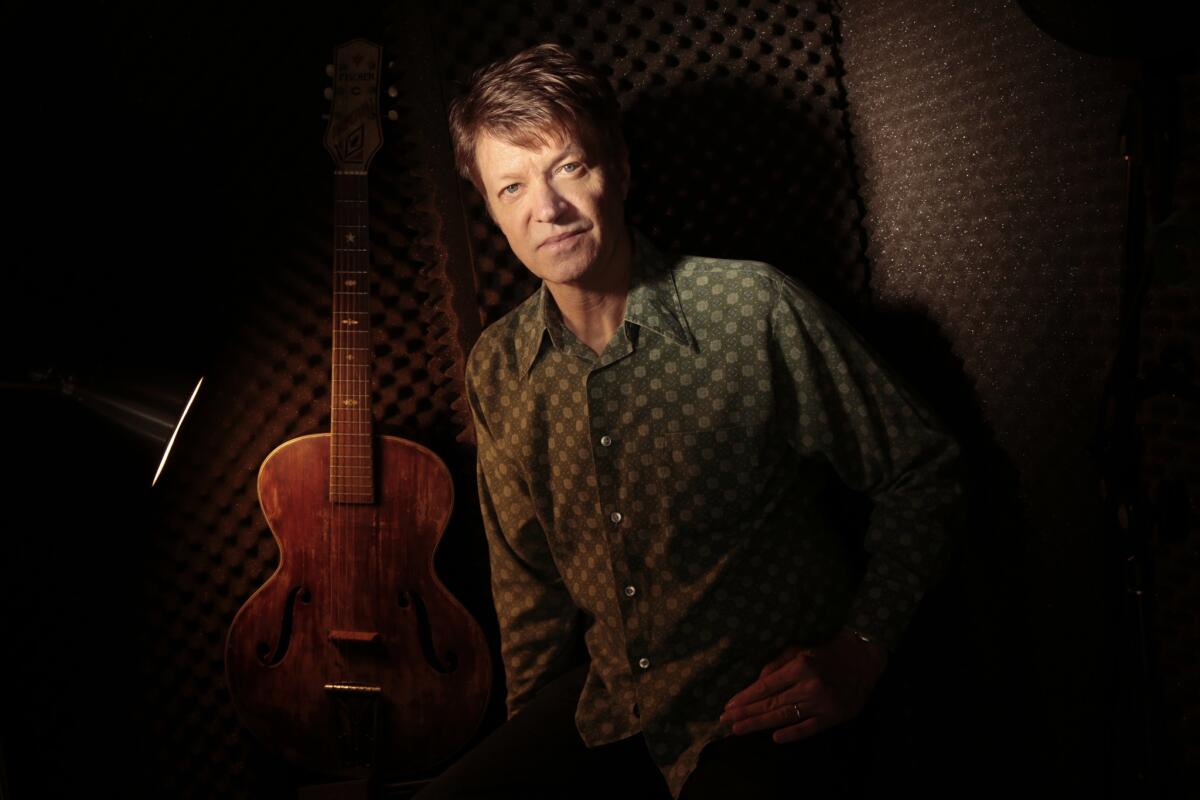Nels Cline, the unlikely guitar hero

- Share via
Picture a guitar hero. What do you see?
Maybe there’s flowing hair shaking before arena-sized crowds, a few technicolor scarves and Eddie Van Halen-esque spotlight posturing. Or maybe it’s a crowd of gone-too-soon ghosts in Jimi Hendrix, Stevie Ray Vaughan or Duane Allman. But what you don’t immediately imagine is a lanky, cerebral and unfailingly humble 58-year-old in Wilco guitarist Nels Cline.
“Nels is like an incredible addition to that lineage of super-creative guitarists,” said drummer Billy Martin of the genre-skipping instrumental trio Medeski Martin & Wood.
Last month, the trio released a bewitching, all-improvised live album with Cline called “The Woodstock Sessions,” one of three recordings the recent Angeleno-turned-New Yorker is issuing this year. On the album, Cline’s shape-shifting guitar squiggles and roars as the foursome shifts from the interstellar interstates of Sun Ra to the groove-heavy fringe of fusion.
“It is [rare] because guitar can become such a cliched instrument,” Martin said. “It’s easy to get into those riffs that many guitarists fall back on without even knowing it. He has a way of just not getting into that cliched world and still has his language and way of expressing himself.”
At a time when the guitar is more marginalized than ever on the pop and so-called indie rock landscape (just look at the recent Coachella lineup), Cline is among the few at the vanguard of the instrument. In rock, Jack White, the Black Keys’ Dan Auerbach and maybe Gary Clark Jr. have earned recent notice, but it’s primarily for the familiar paths they recall. You could make a case for Rage Against the Machine’s Tom Morello and his turntable-like excursions, but it’s been years since that sound captured the imagination.
Jazz boasts a wealth of fleet-fingered virtuosos in beloved players like Pat Metheny and John McLaughlin, but Cline reaches beyond technical mastery into something more raw and expressive. His sound has more in common with the Americana-dusted ventures of Bill Frisell or the slippery tone of relative newcomer Mary Halvorson; both have appeared onstage with Cline in recent years.
Whether Cline is convulsing through a solo that flirts with the edge of chaos alongside Wilco or his own expressive projects, including his all-instrumental trio the Nels Cline Singers, his relentlessly exploratory approach has become something of a signature at a time when many guitarists sound interchangeable. (His trio performs at Largo at the Coronet on May 8.)
Part of what makes Cline unique is an expansive view of his instrument. Along with banks of electronic pedals that can loop, warp and otherwise mangle his sound, his toolbox includes more low-fi approaches to his instrument, including coiled springs, a chopstick and the occasional children’s toy, including something called a Megamouth that has allowed Cline to shout ghostly textures through the pickups of his guitar.
“Utilizing these things, it’s just something … I seem to have some ability to do,” said Cline, speaking by phone just days after rehearsing with another project, wife Yuka Honda’s revitalized Cibo Matto. “I don’t think it was ever a design, it’s just something that seems to work. In some ways, I am trying to expand the expressive capabilities of a guitar, but it’s more about that than innovation or novelty.
“I think all I’m doing are just variations on what people have done before me,” Cline demurs. “I just do it my way — I guess I have to, I’m me!”
Growing up in Los Angeles, Cline and his twin brother, Alex, fell under the spell of the West Coast jazz scene of the ‘60s and ‘70s at clubs such as Shelly Manne’s Manne-Hole in Hollywood and the Lighthouse Cafe in Hermosa Beach. Alex gravitated toward the drums while Cline studied guitar, absorbing the influence of psychedelic-era standouts such as Hendrix, Robert Fripp and John Fahey.
In addition to teaming with Alex in the ‘70s in the group Quartet Music, which also featured the late bassist-composer Eric von Essen and violinist Jeff Gauthier (now executive director of the Jazz Bakery), Cline performed with jazz luminaries that included Charlie Haden and Julius Hemphill. Over time, Cline became a leading light on the Los Angeles experimental music scene while exploring the more feral edges of noise-rock with the likes of Lydia Lunch, Thurston Moore and ex-Geraldine Fibbers leader Carla Bozulich.
Cline’s career nourished a cultish if financially unsustainable following until Jeff Tweedy approached him about joining Wilco in 2004. Now in its 10th year, that partnership helped forge a reality Cline says he never expected.
“I think I’ve been able to make one or two career decisions in my life, and one of them was to join Wilco just because I got asked — and it was just one of those things I couldn’t say no to.” Cline said. “And it’s been amazing, of course, but it certainly wasn’t on my radar to join a well-known and highly respected rock band.”
“Nels has obviously this great ability to shred, but he has a remarkable ability to color, to shade,” Tweedy told The Times before the release of Wilco’s 2011 album, “The Whole Love.” “I know people don’t hear that as much, especially because a lot of time what Nels is doing doesn’t sound like a guitar. But that’s got to be one of the things that keeps him satisfied.”
Also contributing to Cline’s satisfaction is having the freedom to explore his still-burning passion for improvised music, a pursuit that’s only grown in stature since moving to New York nearly four years ago. Cline, who had been drawn to the city since he was a teen, was hooked after numerous family visits, including a pilgrimage to New York’s fertile “loft jazz” scene with his brother in the ‘70s, where they frequented venues such as the Village Vanguard, Sweet Basil and Boomer’s.
History-steeped clubs such as the Vanguard and the Blue Note are now just blocks from Cline’s apartment (“Sometimes, I play those places, if they allow wild animals in that week,” Cline jokes). Recent appearances include playing with avant-improvisers Fred Frith and Marc Ribot, and he took part in an April tribute to the late Jim Hall, a guitarist Cline called a “monumental” influence. He also has an August residency planned for John Zorn’s East Village jazz incubator, the Stone.
“I’m just kind of made for New York. I love it, I love it, I love it — I’m sorry, I don’t want people to be mad at me!” he adds, remembering the cross-continental rivalry that can arise among musicians. “My whole life there was this constant New York versus L.A. kind of questions and comments, and I just don’t want to buy into any of that.”
Amid all this activity, Cline has two more albums on the way: a duet release with Grammy-nominated guitar phenom Julian Lage, who has recorded with pianist Fred Hersch and the New Gary Burton Quartet, and a collection of what he calls “mood music,” which includes 13 to 21 musicians from both coasts on a project called “Lovers.” Having time to venture into so many directions while his day job is between albums has Cline feeling extraordinarily fortunate.
“I think that the Wilco guys are very smart in knowing that the other things that we do bring something back to the band,” Cline said, adding that there are plans for the group to reconvene in the fall. “We come back maybe recharged or with a new kind of perspective on something. It’s always going to add and never detract from Wilco.”
In fact, there are aspects of Cline’s output where you can also hear the influence of a comparatively linear rock band. “Macroscope” is the Nels Cline Singers’ most expansive, approachable album yet with new bassist Trevor Dunn as well as turns by Honda, electric harpist Zeena Parkins and Brazilian percussionist Cyro Baptista. Buoyed by a patter of hand drums, the slow-burning “Wedding Band” features a soaring lap steel interlude from Cline that would mesh nicely with the Wilco catalog.
“That’s a real personal revolution there because that’s a 1-5-4-1 kind of progression,” Cline said, lapsing into the wonkier edges of musician-speak to describe the song’s structure. “Shocking, D major! In the last few years, I’ve actually had the temerity to end songs on major triads. What does it mean?”
While Cline’s time with Wilco has expanded his horizons in numerous ways, another byproduct has been the increased interest among devoted guitar fans and gear-heads, many of whom pore over his curious setup and approach. But Cline isn’t trying to be anyone’s hero.
“The guitar geek thing is always there, even guitarists that aren’t as ‘pedaly’ as me,” Cline said. “Oh, I just don’t pay attention to it.... My main message has been unaltered for years, which is that none of that stuff matters.
“What matters is what you decide to do, that you own that. That you do what you want.”
----------------------------
The Nels Cline Singers
Where: Largo at the Coronet, 366 N. La Cienega Blvd., L.A.
When: 8:30 p.m. Thursday
Cost: $30
Info: https://www.largo-la.com
More to Read
The biggest entertainment stories
Get our big stories about Hollywood, film, television, music, arts, culture and more right in your inbox as soon as they publish.
You may occasionally receive promotional content from the Los Angeles Times.











